Bowland Beth
"That her skydance went for nothing / hanging fire on empty air." David Harsent reads "Bowland Beth" from his 2014 T. S. Eliot Prize–winning collection, Fire Songs (Faber & Faber, 2014).
Jump to navigation Skip to content
"That her skydance went for nothing / hanging fire on empty air." David Harsent reads "Bowland Beth" from his 2014 T. S. Eliot Prize–winning collection, Fire Songs (Faber & Faber, 2014).
The Poetry Foundation announced today that Alice Notley has won the 2015 Ruth Lilly Poetry Prize. The annual award of $100,000 honors the outstanding lifetime achievement of a living U.S. poet.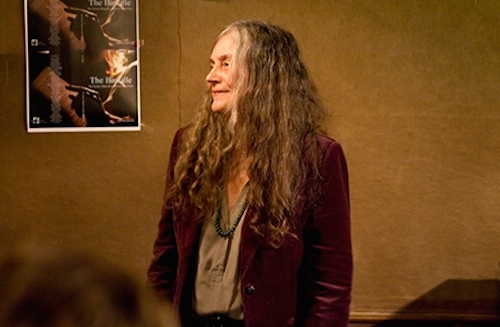
With a career spanning more than four decades, Notley, sixty-nine, is the author of twenty-five books of poetry, including The Descent of Alette (Penguin, 1996); Mysteries of Small Houses (Penguin, 1998), which received the Los Angeles Times Book Prize; Disobedience (Penguin, 2001), which won the Griffin International Poetry Prize; and Grave of Light: New and Selected Poems 1970-2005 (Wesleyan, 2006), which was awarded the Lenore Marshall Poetry Prize. Notley’s other honors and awards include the Poetry Society of America’s Shelley Memorial Award, an Arts and Letters Award from the Academy of Arts and Letters, and a Foundation of Contemporary Arts grant. Later this year, Notley will publish two new poetry collections: Certain Magical Acts and Benediction.
Poetry magazine editor Don Share said of Notley’s work, “Like Whitman, she is simultaneously one of a kind and a poet for each of us: an exemplary, humane, and ultimately essential writer.” Robert Polito, the president of the Poetry Foundation, added, “Book by surprising book, [Notley] reinvents not only herself as a poet, but also what it means for anyone to write a poem at this volatile moment in our history.”
Established in 1986 by Ruth Lilly and sponsored by the Poetry Foundation, the prize is one of the most prestigious American poetry awards and among the largest literary honors for English language works. Adrienne Rich won the inaugural award, and recent winners include Nathaniel Mackey, Marie Ponsot, and W. S. Di Piero.
Notley and the winner of the Pegasus Award for Poetry Criticism will be honored at a ceremony in Chicago on June 8. The Poetry Foundation will announce the winner of the Pegasus Award later this month.
At the Poetry Foundation website, listen to a podcast featuring Notley, who reads and discusses her work, and read a new interview with the Ruth Lilly Prize winner.
"The lessons in tone, rhythm, cadence that you can learn from listening [to music] are important as a poet." Nathaniel Mackey, winner of the 2015 Bollingen Prize for American Poetry, describes how listening to international music has influenced his writing process.
Digital poetry is a form of electronic literature that incorporates the use of computers to display and interact with the work. Heavily influenced by concrete and visual poetry, digital poetry includes use of hypertext, computer generated animation, coding, and holograms. This week, look into some of the digital poems in the Electronic Literature Collection and brainstorm how you'd create one of your poems digitally. If you have programming skills, or know someone who does, put your plan into action and create your own piece of electronic literature!
Beth Gorrie volunteers her time as Executive Director of Staten Island OutLOUD. She spearheads the organization’s program planning and has adapted over twenty-five global classics for OutLOUD’s spoken-word performances. As an actor during the first few years of her working life, she performed with the Chicago Theatre of the Deaf and served as an Adjunct Instructor at the University of Chicago. In New York City, she appeared in a variety of Off-Off Broadway productions and in a series of film installations by award-winning filmmaker William Lundberg, a recipient of the Guggenheim Fellowship. Gorrie attended Columbia University Law School where she was an editor of the Journal of Law & Social Problems, and spent a summer in rural India on a human rights fellowship. She is a former partner in a leading New York law firm and has participated in community service in Harlem.
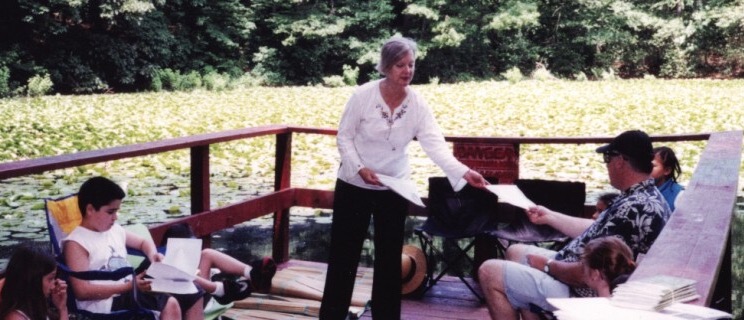
What makes your programs unique?
Staten Island OutLOUD gathers neighbors to explore global literature together, and to share ideas. Our first event took place shortly after September 11, 2001 when we had a deep need to gather together.
Since then, Staten Island OutLOUD has grown and has continued that spirit with a varied series of grassroots gatherings. Throughout the year, we host free events to explore global literature, our diverse backgrounds, our history, and our mutual concerns. OutLOUD is entirely volunteer-driven.
We operate on a small budget, but we’re very productive. Since our establishment in September 2001, we’ve served over 23,000 participants with over six hundred free events, in twenty-one languages.
What recent project have you been especially proud of, and why?
From September 2014 through March 2015, Staten Island OutLOUD hosted a series of forty community events about Harper Lee’s novel To Kill a Mockingbird. When we started planning our series a year earlier, we never guessed how timely it would be, following the July 2014 death of Eric Garner, an African-American neighbor of ours who died in police custody.
Our “Mockingbird” series explored national and local civil rights history, together with music and poems from the Civil Rights Movement, and from the Depression years in which the novel is set.
Tensions ran high during the months after Garner’s death, but our series fostered thoughtful discussions. Staten Islanders talked, listened, and considered the many facets of the crisis.
What’s the most memorable thing that’s happened at an event you’ve hosted?
Adults with special needs sometimes attend Staten Island OutLOUD programs. At one event when we discussed a variety of twentieth-century poems, a woman with mental disabilities gathered her courage to comment on a poem by Dylan Thomas. She had never spoken in public before, and she knew that the audience included teachers, attorneys, and other professionals. Everyone encouraged her, and as she spoke, she began to hold herself more confidently, and her voice grew stronger. Everyone was moved when she read, “Do not go gentle into that good night.”
What are the benefits of writing workshops for special groups?
Staten Island OutLOUD’s work proves that when people have a forum and a stimulating entrée for conversation, they respond thoughtfully. Stereotypes can fade and real communication can begin. Our work with teens and with elders underscores the value of writing workshops for those members of our community. Our writing workshops have enabled people to find their unique voices. For teens who may have manifested behavior problems before they began our workshops, some of those problems began to ebb as they focused their energy on writing and as they gained confidence in their work. Elders who had never done any creative writing before participating in our memoir and poetry workshops have drawn real satisfaction in exploring their writing talent, in reflecting on their life experiences, and in recognizing how powerful their pens can be.
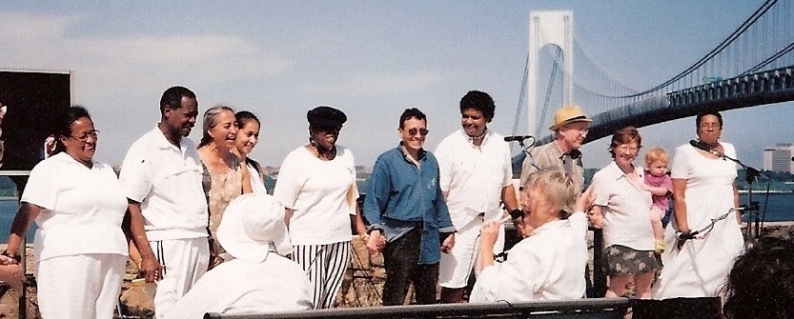
Photo: (top) Beth Gorrie at Huckleberry Finn at High Rock workshop. Photo: (bottom) Cast of Moby Dick marathon reading. Photo Credit: Staten Island OutLOUD.
Support for Readings & Workshops in New York City is provided, in part, by public funds from the New York State Council on the Arts, and the New York City Department of Cultural Affairs, with additional support from the Louis & Anne Abrons Foundation, the Axe-Houghton Foundation, the A.K. Starr Charitable Trust, and the Friends of Poets & Writers.
Kevin Coval and Nate Marshall, editors of the poetry anthology The Breakbeat Poets: New American Poetry in the Age of Hip-Hop (Haymarket Books, 2015), speak about the impact hip-hop has had on poetry and on their own writing.
Submissions are currently open for the inaugural Pleiades Press Editors Prize for Poetry. A prize of $2,000 and publication by Pleiades Press, with distribution by Louisiana State University Press, will be given annually for a poetry collection. The winner will also be invited to read at the University of Central Missouri in Warrensburg. The editors will judge.
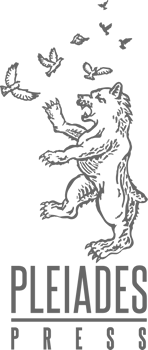 Using the online submission manager, send a poetry manuscript of at least 48 pages with a $25 entry fee, which includes a poetry collection published by Pleiades Press, by May 4. Submissions may also be sent via postal mail to Pleiades Press, Department of English, Martin 336, University of Central Missouri, Warrensburg, MO 64093.
Using the online submission manager, send a poetry manuscript of at least 48 pages with a $25 entry fee, which includes a poetry collection published by Pleiades Press, by May 4. Submissions may also be sent via postal mail to Pleiades Press, Department of English, Martin 336, University of Central Missouri, Warrensburg, MO 64093.
Established in 2000, Pleiades Press is housed at the University of Central Missouri. The press releases several poetry books each year and also publishes the literary journal Pleiades. For the past fifteen years, the press has also administered the Lena-Miles Wever Todd Poetry Prize. Recent winners include Adrian C. Louis, Katie Bichkham, Abigail Cloud, Katy Didden, Bruce Snider, and Julianna Baggott.
Brett Fletcher Lauer and Lynn Melnick, editors of the poetry anthology, Please Excuse This Poem: 100 New Poets for the Next Generation (Viking, 2015), introduce poets from the collection at a reading at the Strand Book Store in New York City.
Music and poetry both use sounds and lyrical passages to stir up emotion. This week, put on a piece of classical or instrumental music with a pen and paper nearby. While listening, jot down any ideas that come to you, any emotions you experience, any images you see. Once the piece ends, play it from the beginning and start writing a poem that embodies the music. Let your syntax mirror the music's movement, your sounds blend and layer like the instruments in an orchestra, and your themes evoke the story within the piece of music you've chosen.
Alanna Lin Ramage is a writer, songwriter, and artist-in-residence at the Los Angeles Little Tokyo Branch Library, where she hosts innovative, community-building events and workshops at the Los Angeles Department of Writing and Power (LADWP!*). She has studied poetry with Thomas Sayers Ellis and poetics and performance theory with Jon Wagner and Mady Schutzman at California Institute of the Arts. Ramage composes original lyrics and music for film and television. This year sees the release of a cover album inspired by the Beatles in tandem with publishing her first collection of poems about monastery wildlife in Northern California.
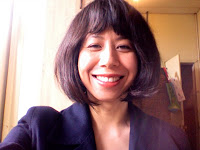
A few years ago, in a fit by candlelight, I came up with a syllabus for a workshop called Alters/Altars. It was designed to help a person write and explore their way into an alter ego—the poetic self that feels its own voice and power while feeling all, but not revealing all.
In February of this year, thanks to support from Poets & Writers and the Little Tokyo Branch Public Library, I was able to teach a five-week version of the workshop in downtown Los Angeles.
One premise I was working with included the physical effect of writing as a physical act. For each class, participants would read their pieces aloud and receive positive feedback from the group. In some cases the reading would be formal, at the front of the room. On other days, I had readers stand in the middle of a group circle that echoed words or phrases as the story unfolded. One writer noticed that she read to a mostly quiet circle. She later commented that she realized she had to read "painfully slowly" to give listeners a chance to register her words more fully. She reread her piece to us and we happily listened to every word.
In another exercise, we gave alternate names to one another. The unspoken invitation was: “What name suits me in your opinion? What is my sonic incarnation? Do you really think it’s ‘Bubby?’”
The first workshop started with participants reading personal biographies or ads, and then writing fictional personal ads for someone other than themselves. The exercise allowed us to get to know each other while ascertaining each person’s unique writing style. Week two’s life stories were especially intense, offering glimpses into epic quests for love and destiny. Week three featured hypothetical after-life sequences from each person—revealing visions of beautiful, earthy, sublime, and often hilarious realities to come.
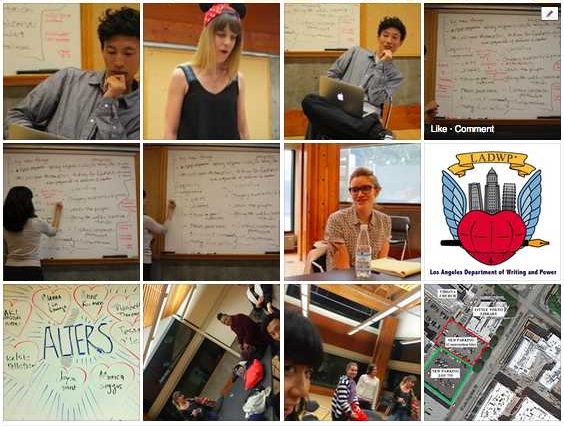 We had a dynamic, talented, and punctual group. It was a pleasure to discuss personal creative journeys, hear the mix of angst, frustration, wisdom, confidence, and steady determination that characterized each person. The group had great discussions about what makes a “healthy writer” versus what makes a “happy writer.”
We had a dynamic, talented, and punctual group. It was a pleasure to discuss personal creative journeys, hear the mix of angst, frustration, wisdom, confidence, and steady determination that characterized each person. The group had great discussions about what makes a “healthy writer” versus what makes a “happy writer.”
My favorite session of the workshop included an assignment that asked participants to write about a sublime or transcendent moment. The results were diverse and fantastic. There was a great relationship-ending-epiphany story, an excellent dim-sum-as-travel-as-exploration-of-life story, a profound unity-with-wild-crustaceans story, and a stirring overcoming-self-while-overcoming-mountain story.
The session made me think about how creative anxiety can sometimes blind us to the larger themes we've experienced in life. It may keep us from sharing the stories we’ve already lived or from inventing stories that might express what we know.
So how do we move past this anxiety? Decide what themes are important to you based on your life experience. Once you have: Write on! (OK, that was a bad pun. I’m a workshop leader—it’s allowed.)
Writing alters you. Be brave and do the work; you just might tell a riveting story as you sacrifice your fears.
Photo 1: Alanna Lin Ramage; photo 2: Alters/Altars workshop. Credit: Alanna Lin Ramage and Anne Rieman.
Major support for Readings & Workshops in California is provided by the James Irvine Foundation. Additional support comes from the Friends of Poets & Writers.